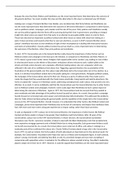Evaluate the view that Party Policies and Manifestos are the most important factor that determines the outcome of
UK general elections. You must consider this view and the alternative to this view in a balanced way (30 Marks)
Looking over a range of General Election Case Studies, one can determine that Party Policies and Manifestos are
not the most important factor that determines the outcome of UK General Elections in comparison to other factors,
such as political context, campaigns, party leaders and the role of the press. Party policies and Manifestos usually
set out the political agenda that the Party will be pursuing during their time in government, providing an integral
insight into what voters can expect from that party in an attempt to persuade/solidify voters to vote for them.
These have become less important as political context and other factors as voters shift away from relying on a
party's future promises and towards what they've seen pre-elections, as seen in 2019's General Election where
Labour's manifesto was seen as over-ambitious in light of their incompetence in dealing with inter-party fractures
and claims of antisemitism. Overall, political context has proven itself as a more important factor in determining
the outcomes of the Election, rather than party policies and manifestos.
To start, 1979's Conservative win in the General Election really shows the importance of other factors such as
Political Context and Campaigns in the lead up to the election, in comparison to Manifestos and Party Policies. In
1979, Labour's government under James Callaghan had capped public sector workers' pay, leading to mass strikes
in what became known as the Winter of Discontent. Ambulance drivers refused to work, rubbish piled on the
streets and trade unions became very unpopular, effectively making Labour also very unpopular, which was
reflected in the vote of no confidence that Labour lost. Triggering a general election, the accumulation of the
frustrations of the general public over the Labour reign effectively led to the Conservative win in the election. As a
result, it is obvious that political context led to the public opting for a new government. Alongside political context,
the Campaign of the Conservatives also led to their win. Posing as a party of national unity, they made sure to
create the image that they would deal with the Trade Unions practically. Using Saatchi and Saatchi advertisers, the
Tories circulated the "Labour isn't Working" poster, addressing unemployment under Labour, that proved to be very
effective. As a result, it can be confidently said that the Conservatives won the General Election due to other factors
such as Political Context and Campaigns. However, some could argue that Manifestos do have a great impact on
determining the outcomes of Elections. Again in 1979, the Conservatives took into account that they needed to
seem moderate and take advantage of the political turmoil caused by Labour. As a result, they pushed a campaign
heavily focused on removing trade union power and reintroducing mild privatisation. This addressed the problems
that the Trade Unions had been giving the general public and the repetition of this simply led to the Conservatives'
success in the 1979 General Election. Overall, however, it is undeniable that other factors, like Political Context and
Campaigns, prove more important than Manifestos due to the lack of consistency and impact that manifestos have
had, with more and more voters using past experiences to impact voting, rather than future promises.
To add, as displayed in 1997's Labour win in the General Election, the importance of other factors like Political
Context and Party Leaders is shown to be greater than Manifestos and Party Policies. After 18 years of the
Conservatives, Labour won in the 1997 General Election. In those 18 years, the Conservatives had divided
themselves over the EU, numerous scandals, a failure to deal with the Black Wednesday crash that escalated into
more expensive mortgage payments and a divided Britain due to rising inequality. Such government failures could
not be left unaccounted for. As a result, the Conservatives were voted out of office, and Labour's redesign as a
moderate party all but confirmed the Labour win. Clearly, Political Context played a large role in the Conservative
loss in 1997. As well as Context, the Party Leaders of both side played an important part in the electoral result. For
example, the Conservatives' incumbent John Major was seen as a lifeless and incompetent figure. In stark contrast,
Labour's young, charismatic and dashing Tony Blair, at only 43, promised changes and was more accepting of
compromise with opposition voters. A metaphor for the difference Labour wanted to bring, Tony Blair's leadership
played a large role in their win in 1997. However, it could be argued that Manifestos are the most important factor




